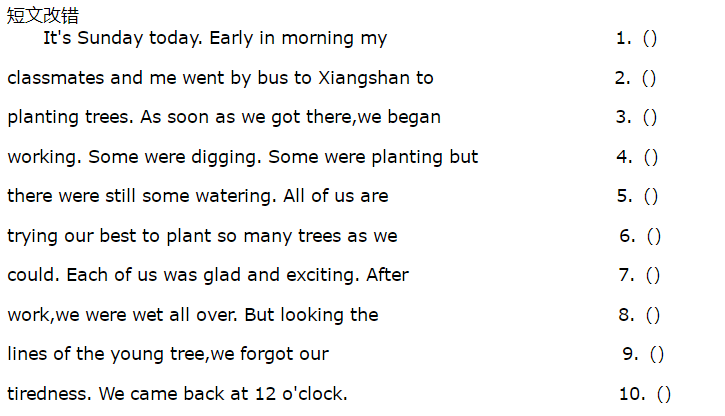2022年高职单招每日一练《英语》5月31日
考试总分:10分
考试类型:模拟试题
作答时间:60分钟
已答人数:524
试卷答案:有
试卷介绍: 2022年高职单招每日一练《英语》5月31日专为备考2022年英语考生准备,帮助考生通过每日坚持练习,逐步提升考试成绩。
试卷预览
-
1. —____you ever ______America?—Yes, I have.
AHave; gone to
BHave; gone in
CHas; been to
DHave; been to
-
Consider these situations:You have just read an excellent book and want to tell a friend about it. You have seen an exciting movie and want to (1)your instructor to go to see it. You have heard an inspiring lecture,and want to (2)your new found knowledge with a roommate who didn't attend the lecture.
How to give this type of(3)? You could tell everything you(4)about the book,movie,or lecture,but you will probably just want to select the (5)points and tell these to your listener. This,of course,is called summarizing.
To create a good summary—one that is both accurate and brief—you need to follow two steps. First,(6)information by reading,taking notes,or listening carefully so that your summary is as brief as possible but still accurate and (7).Your audience will help you decide how thorough you need to be. If you give your summary to (8)perhaps for an examination,it will need to be extremely complete
(9) accurate. You will need to keep in mind any (10)your instructor might have given you during the lecture to indicate what he or she considers especially important.If you are summarizing a movie for a friend,you can be less thorough. Part of the task of summarizing is knowing what to include and what to leave out.
2. 第(8)选()A an instructor
Ba friend
C your family
D your audience
-
America is a mobile society. Friendships between Americans can be close and real,yet disappear soon if situations change. Neither side feels hurt by this. Both may exchange Christmas greetings for a year or two,perhaps a few letters for a while—then no more. If the same two people meet again by chance,even years later,they pick up the friendship.
This can be quite difficult for us Chinese to understand,because friendships between us flower more slowly but then may become lifelong feelings,extending(延伸) sometimes deeply into both families.
Americans are ready to receive us foreigners at their homes,share their holidays,and their home life. They will enjoy welcoming us and be pleased if we accepttheir hospitality(好客) easily.
Another difficult point for us Chinese to understand Americans is that although they include us warmly in their personal everyday lives,they don't show their politeness to us if it requires a great deal of time. This is usually the opposite of thepractice in our country where we may be generous with our time. Sometimes,we,ashosts,will appear at airports even in the middle of the night to meet a friend. Wemay take days off to act as guides to our foreign friends. The Americans,however,express their welcome usually at homes,but truly can not manage the time to do agreat deal with a visitor outside their daily routine. They will probably expect us toget ourselves from the airport to our own hotel by bus. And they expect that we willphone them from there. Once we arrive at their homes,the welcome will be full,warm and real. We will find ourselves treated hospitably.
For the Americans,it is often considered more friendly to invite a friend to their homes than to go to restaurants,except for purely business matters,So accept their hospitality at home!
3. The writer of this passage must be ____.A an American
Ba Chinese
Ca professor
Da student
-
1. 单句改错,选出括号里的错误选项,并改正。[A](Does) she [B](go to work) [C](by) [D](a car)?
-
2. 单句改错,选出括号里的错误选项,并改正。[A](What) [B](colour) [C](is) [D](your jeans).
-
3. 单句改错,选出括号里的错误选项,并改正。The [A](main) character [B](of) the story [C](called) [D](Snow White) .
-
1. The doctor was tired. He wanted to stop ()(have)a rest.
-
2. It took Tom an hour ()(do) his homework.
-
从下面选择适当的词填空,完成句子,每词只用一次。
under,behind,below,in front of,near,above,inside,outside,over,across
3. The teacher stands () the blackboard.
-
1.

相关试卷
-
2022年高职单招每日一练《英语》10月20日1036人做过
-
2022年高职单招每日一练《英语》10月21日460人做过
-
2022年高职单招每日一练《英语》10月22日1234人做过
-
2022年高职单招每日一练《英语》10月23日576人做过
-
2022年高职单招每日一练《英语》10月24日1980人做过
-
2022年高职单招每日一练《英语》10月25日394人做过
-
2022年高职单招每日一练《英语》10月26日503人做过
-
2022年高职单招每日一练《英语》10月27日781人做过
-
2022年高职单招每日一练《英语》10月28日1169人做过
-
2022年高职单招每日一练《英语》10月29日501人做过
相关题库